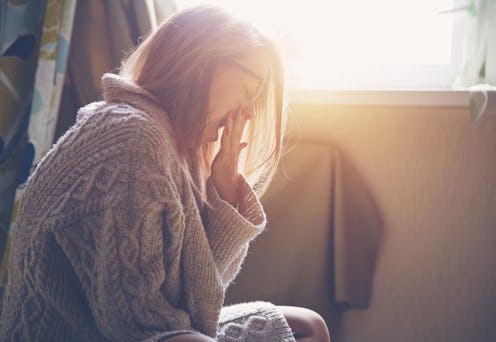Life
This Is Why You Never Get A Good Night’s Sleep After Drinking
There was a time when drinking any alcohol made me sleep like a baby. In my earliest drinking days, when I was 21, I could count on falling (sometimes literally) into bed after a glass of wine or two, and snoozing peacefully for many hours. Hangovers posed an occasional obstacle, but sleep was so reliable that it almost didn't matter! Recently, though — read: as I've gotten older — things have changed, and I've begun to question, why do I sleep worse after drinking now? That was most definitely not part of the deal.
It's no secret that alcohol has wide-ranging effects on your body when you're awake. As long as you're still up and aware, you can start to feel those effects setting in, but it's easy to assume that they subside when you get yourself to bed. Not so! Your body doesn't stop working just because you've decided that it's time to get some shut eye.
I'm about to tell you more about the science behind alcohol and sleep (or a lack thereof), but you should know that there are ways to set yourself up for better rest after you've been drinking. Lifehacker recommends eating a balanced meal before you start on the booze, sipping on plenty of water during and after your drinking session, and cutting yourself off early. While these tips may not guarantee high-quality sleep, they should help combat the alcohol-induced physiological problems that can rob you of much-needed Z's.
Your Body Temperature Drops More Than Usual
It's perfectly normal for your body temperature to decrease a few degrees after you fall asleep, but drinking accelerates and intensifies that process, according to sleep site Van Winkle's. The drop your body experiences after a night of boozing it up is more marked than the one it experiences when you stick to water — and your circadian hormone schedule is disrupted as a result.
Your Hormones Are Out Of Whack
When your body temperature drops, your pituitary gland — which, according to aptly named Hormone.org, is responsible for the production and distribution of hormones throughout your body — loses its ability to dispatch certain chemicals to your system at the regular intervals that allow you to sleep soundly. Per Van Winkle's, good sleep requires the regular production and release of the hormones HGH and melatonin, and if your pituitary is too boozed up to make that happen correctly, you're going to do a lot of tossing and turning.
You're Running To The Bathroom
Whether you're drunk or sober, your sleep schedule is in no way helped when you find yourself constantly waking up to make trips to the restroom. According to Huffington Post, alcohol is a potent diuretic, which basically means that it causes your body to generate more urine than usual. When you drink, you're bound to be up throughout the night flushing your system.
Your Respiratory System Is Compromised
Alcohol loosens up more than just your inhibitions. It also reduce muscle tone in your upper airway, according to Huffington Post, which might make it challenging for you to breathe normally while you sleep. This is especially problematic for people who already suffer from chronic snoring or sleep apnea.
Your REM Cycle Is Inconsistent
According to the National Institute of Child Health and Human Development, the human brain experiences five distinct phases during sleep, the last of which is called rapid eye movement (REM) sleep. Typically, REM sleep accounts for about 25 percent of the sleep cycle and sets in roughly 70 to 90 minutes after you've called it a night. REM sleep becomes inconsistent when you add alcohol to the mix, per Van Winkle's. Early in the night, you'll have trouble getting into your REM cycle, and later on, your body will overcompensate by getting more than it needs so close to wake-up time.
Your Nervous System Is Sensitive
You probably know from middle school health class that alcohol is chemically categorized as a depressant, which is why drinking it can make you feel like every part of your body is moving through really heavy sand. Per Health24, booze also slows down our brain and central nervous system. After your liver has finished processing the alcohol, your nervous system suddenly goes from being highly depressed to highly sensitive, per Van Winkle's. Because of this, you'll be more likely to wake up in the middle of the night because of random lights or sounds.
